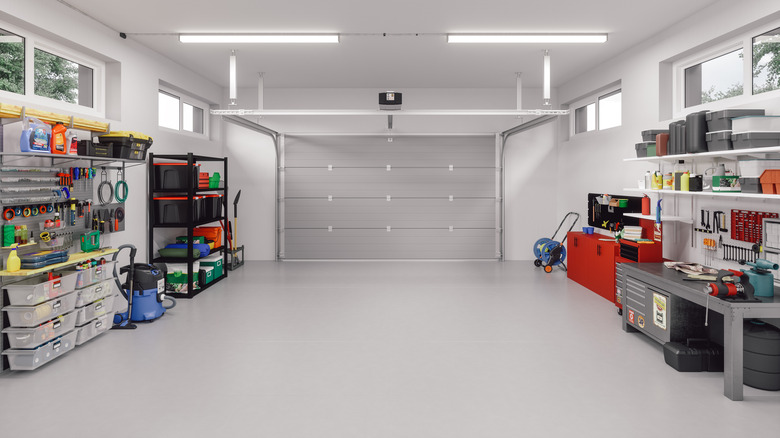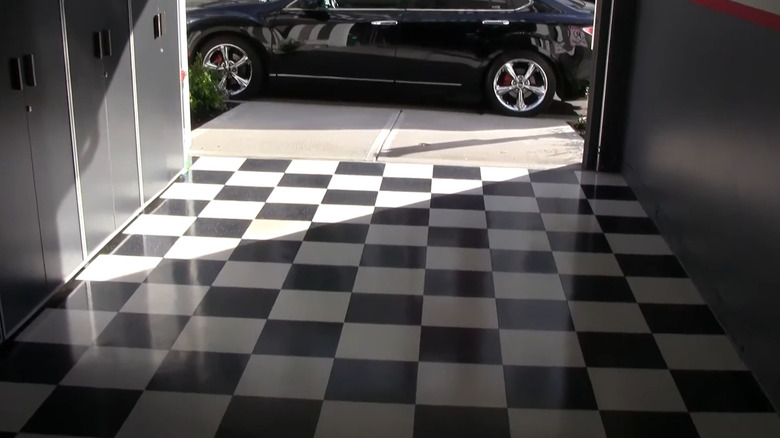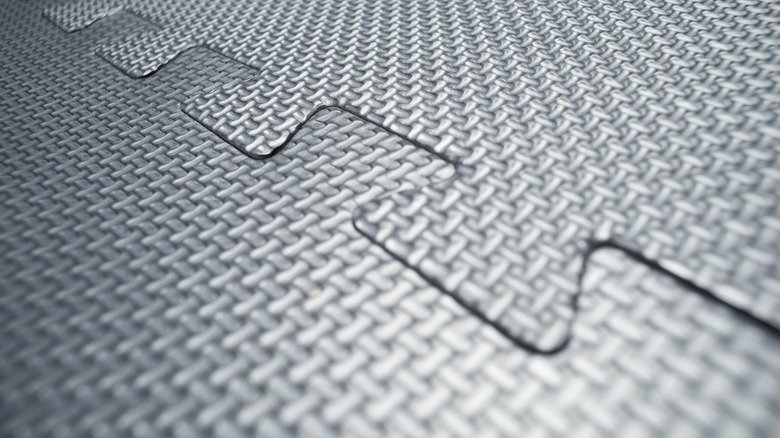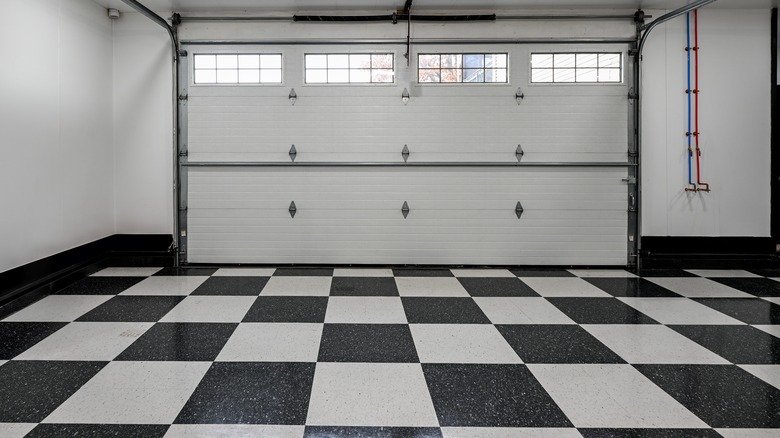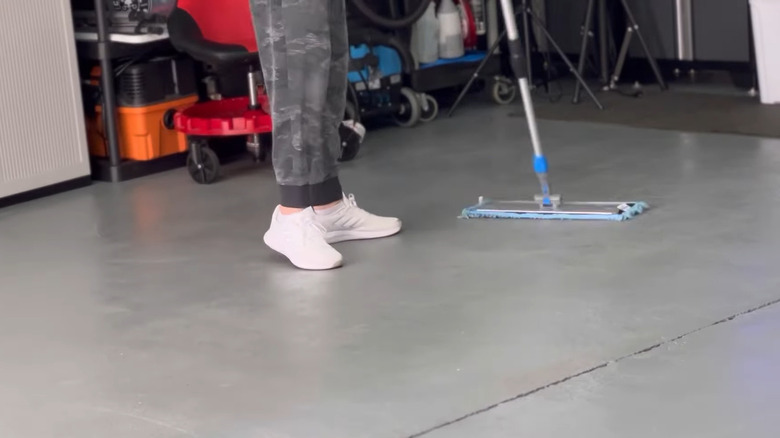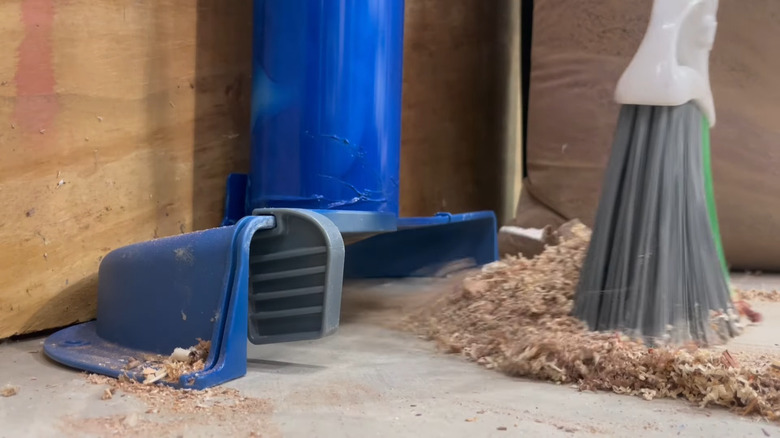5 Garage Flooring Hacks You Didn't Know You Need
Depending on your age and where you live, you might have been in a garage with a dirt floor (at least one of our writers is old enough to remember a neighbor sweeping her dirt yard, but let us speak no more of the inexorable march of time). A dirt floor in a well-situated garage actually had a lot going for it: Low cost, durable, easy, flexible, and easy to clean by virtue of not needing to be cleaned at all. Since you're not likely to gift yourself a dirt garage floor anytime soon, we've found a few ways you can get a lot of the same benefits: Cheap and easy, flooring that's pleasant to stand on for hours, and a few ways to minimize the fuss of cleaning up.
Garage flooring has been dominated in recent years by epoxy-based options and a few other flooring options to consider for your garage that emphasize durability and easy maintenance. Epoxy is strong and non-slip out of the gate, and with a urethane topcoat it is virtually indestructible. It's popular in garages, but can be found everywhere, such as loft apartments, in the sorts of churches that have walls made of pallet wood, covered with clippings in hair salons, etc. However, epoxy isn't your only garage floor option — far from it, in fact. For some great alternatives (and a few other handy garage floor hacks) read on.
Consider commercial vinyl tile
Vinyl flooring is an increasingly common solution for garages and for homeowners trying to tame a slab. Glue-down vinyl plank and tile can be had for as little as $1.50 per square foot, or as much as $10/foot... making it one of the more expensive options at the upper end. What's more practical and, frankly, appropriate-looking in a garage is commercial vinyl composition tile (VCT).
VCT has a lot in its favor. It's unbelievably strong, including under rolling loads as you'd expect to find in most garages. It comes in large-format tiles that are quick to install. And it's a fairly green option, too, often containing a high percentage of recycled vinyl and locally quarried North American limestone. Some complain that it's slippery when wet — and wetness is a thing that happens in most garages — but VCT is commonly used in schools and commercial retail spaces. It also comes in anti-slip options if that's a must for you.
Where VCT really gets interesting is in its pricing. It can be had for as little as $1.50 a foot at full retail price, and as cheap as $2 for premium large-format tile. Occasionally, you can shop at the warehouse sales of discount operations like Really Cheap Floors and pick up commercial VCT for as little as 20 cents per foot, plus shipping. Yes, you read that right. You won't get a lot of color and pattern options, but your garage might not be a space where that's a big concern.
Do you need workshop flooring instead of garage flooring?
It is, of course, possible that you don't park a car in your garage at all. Sometimes this is because of the sheer volume of Christmas decorations, outdoor equipment, craft supplies, and an alarming number of empty aquariums and pet cages stored there. But, more likely if you're the DIY type, it's because you've co-opted the garage as a workshop. If that's the case, then keep in mind that the demands of a workshop floor are a little different than the requirements of typical garage flooring.
While showroom-like home auto garages are meant to look good and regular garage floors are meant to last as long as possible, a woodworker or DIYer might mostly be interested in how comfortable it is to stand around all day at different pieces of equipment around the shop. It's also important that the flooring be reasonably durable, and since padding and invincibility aren't commonly available in the same flooring product, some opt for a durable floor with rubber tiles or mats set out in specific areas.
There are a lot of options when it comes to rubber tiles and floor mats. Materials come in residential and commercial varieties and might be sold for garages, gyms, playrooms, and even playgrounds. They come in various thicknesses, an unbelievable range of colors, and lots of designs. You can expect to pay $1.63 or more per foot for rubber flooring, and $1 or more for rubber tiles, mats, and runners.
Don't forget peel-and-stick floor tiles
If cheap isn't your goal, here's a surprising option: peel-and-stick tiles. If you're thinking that's usually an inexpensive option, you're right, but things are a little different in the garage. Garage stick-down tiles are often commercial grade and are designed for the rigors of a working auto shop. Adhesion can be a particular concern in auto shops, where heavy equipment and cars being jacked up and down can exert a lot of unforeseen forces on very small areas of flooring.
You're probably thinking that peel-and-stick flooring doesn't sound like anything you've seen in a garage before, but picture the black-and-white checkerboard pattern that is often used on the floors of performance garages. That's very often peel-and-stick tile. Other common patterns include diamond plate, combined checkerboard/diamond plate, and that flaked pattern that's meant to suggest terrazzo but these days mostly says "epoxy." Peel-and-stick can cost as little as $1 per foot, but you're probably going to want heavier-duty options that run between $2 and $5.50 per foot.
Clean with a rinseless floor wash
Let's look at a couple of hacks you can use to keep your flooring — including epoxy and similar concrete coatings — looking good and staying in tip-top shape. One great option, especially if you don't have a drain installed in your garage floor, is to use a rinseless cleaning solution. While epoxy and other coatings are reasonably chemical-resistant, you still have to take care with which cleaners you use on them.
DIY Detail's Rinseless Wash, designed for cleaning cars within the confines of a garage, also turns out to be a very effective option for many types of garage flooring. It's pH balanced (important for epoxy coatings) and non-abrasive. In fact, most rinseless cleaners tend to be formulated for cars, but you can find flooring-specific options like Member's Mark Commercial No-Rinse Floor Cleaner from Sam's Club.
Well-formulated products will leave behind little residue, including ingredients that cause a hazy finish after drying and, worse, can become slippery when exposed to water... which is not unusual when you bring a car in out of the rain. You would typically add the cleaner to a little water, then apply it using a mop. One great option is the Autofiber Shop Mop, an adjustable and very wide option that holds a lot of cleaner in its microfiber heads to cover a lot of area in one go. Use a dry microfiber cloth or mop head to dry the floor.
Vacuum and sweep your garage floor at the same time
We've recommended leaf blowers more than once as a handy tool that makes cleaning your garage a breeze, but woodworkers and those with a central vacuum system have another option available to them: sweeping the floors into dedicated "floor sweeps." These are usually galvanized bits of pipe that hook to your central vac or dust collection system and have a port (sometimes with a hinged door) into which you can sweep whatever gets freed up when you're running a broom around the workshop. They come in various sizes and can cost from around $90 to $400 or more for each sweep. These typically come sized to attach to large-diameter dust collection ductwork, so adapters might be needed for a common household central vacuum system.
Smaller-scale and cheaper options that are sized for vacuums (central and otherwise) and for common Shop Vac hoses can be had for around $11 to $17. Floor sweeps made for central vacuums are designed to integrate into framed walls and turn the vacuum on when opened. The simple circuitry involved (often just a spring and a contact plate) can be easily adapted to operate a dust collection system via a relay or home automation platforms like ESPHome.
